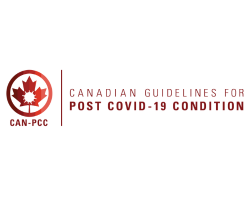Overview
Post COVID-19 Condition in Canada
"The COVID pandemic has had devastating effects on our society and on human health and mortality. Over the past two years, evidence has emerged to suggest that the impacts of COVID-19 extend beyond the acute phase of the disease which, in some infected individuals, can turn into a chronic illness. In Canada, as of August 2022, more than 1.4 million people – or about 15 percent of adults who have contracted COVID-19 – say they experience symptoms three months or more after their initial SARS-CoV-2 virus infection. These include respiratory, cardiovascular, neurological and cognitive impairments and they can be debilitating.
These longer-term symptoms are collectively identified as post-COVID-19 condition (PCC), or long COVID. PCC is not a homogeneous disease, as different individuals can present different sets of symptoms. Currently, there is no consensus definition of the condition or its diagnosis and few if any clinical practice guidelines are available."
Read more about PCC in Canada here: Post-COVID-19 Condition in Canada: What We Know, What We Don’t Know and a Framework for Action
Usask Develops Provincial PCC Education Program
Info and Resources
Patients & Families

Click the link below to access information and resources for individuals experiencing PCC & their families.
Health Care Providers

Click the link below to access resources for healthcare providers supporting individuals experiencing PCC & their families.
Organizations

Click the link below to access resources for organizations supporting individuals experiencing PCC & their families.
Webinar Registration

Click the link below to find out more information and register for upcoming webinars for Post COVID-19 Condition.
Webinar Recordings

Click the link below to access all webinar recordings and slide deck presentations of past Post COVID-19 Condition events.
National Resources
CAN-PCC Guidelines

The Public Health Agency of Canada (PHAC) funded Cochrane Canada and the McMaster GRADE Centre to develop national, evidence-based guidelines for Post COVID-19 Condition (PCC). To learn more about these Guidelines, their team, and their approaches, visit their project website.
MyGuide: Long COVID

MyGuide: Long COVID (British Columbia) is a network that supports and conducts research on Post COVID-19 Condition (PCC) and provides a resource that helps individuals who experience PCC to create a personalized guide based on each their symptoms and experience. It should not be used to self-diagnose or replace medical advice. Learn more by visiting their website.
Long COVID Web

Long COVID Web is designed to bring together researchers, healthcare professionals, and patients to address the challenges of Post COVID-19 Condition (PCC). It also organizes events such as the Canadian Symposium on Long COVID, to encourage knowledge-sharing and action on gaps in care. To learn more, click on the link below to visit their website.

